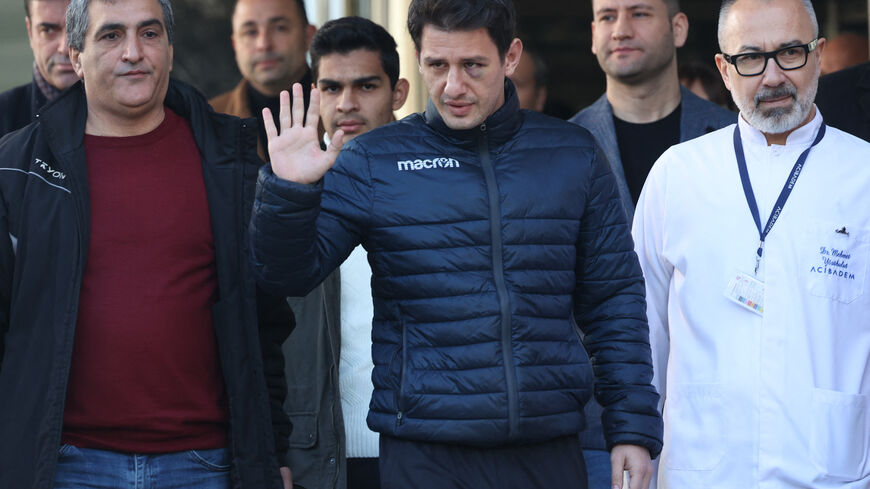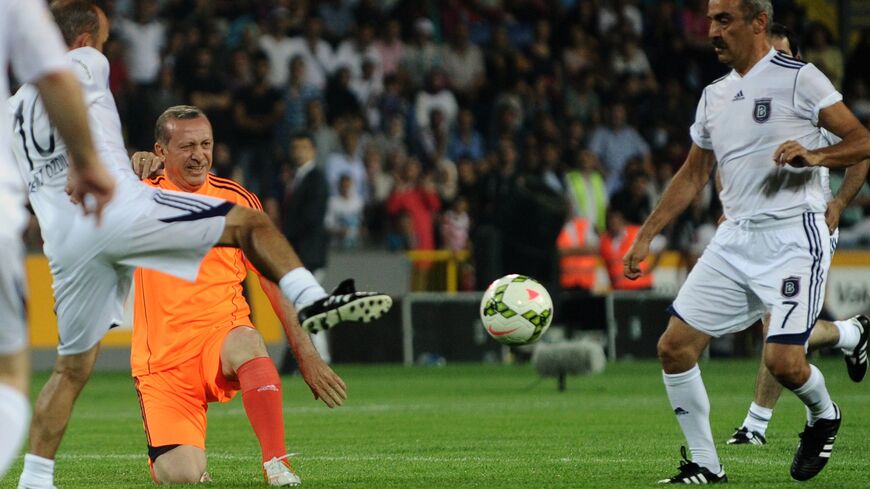Match-fixing probe shakes Turkey's football as referees, executives detained
The football scandal expanded after the Turkish Football Federation's suspension of referees and assistants amid a nationwide betting probe.

An expanding scandal in Turkish soccer is putting the sport and national institutions to a test, as authorities investigate corruption in a game long tied to power, politics and prestige.
The Istanbul Chief Public Prosecutor’s Office on Friday announced detention orders for 21 people, including 17 referees and three club executives, as part of its broadening investigation into a betting scandal. Prosecutors charged the referees with “abuse of duty” and “manipulating match results” and accused Eyupspor President Murat Ozkaya, former Kasimpasa owner Turgay Ciner, and former club president Fatih Sarac of “influencing the outcome of matches.”
On Oct. 27, the Turkish Football Federation (TFF) suspended 149 referees and assistants in the Super Lig, Turkey’s premier league, after investigators uncovered scores of gambling accounts and wagers by officials.
The suspensions followed an inquiry launched in April by the Istanbul prosecutor’s office that has since expanded nationwide with support from state institutions.
Prosecutors said on Friday that the case is now proceeding on two separate, parallel tracks: a criminal investigation, led by their office, and a disciplinary probe, conducted by the Turkish Football Federation (TFF). The prosecutor’s office stressed that the two processes are independent — meaning a referee or official cleared by the TFF could still face prosecution under the judicial inquiry, which is nationwide.
The investigation, prosecutors note, spans “the entire football ecosystem,” from amateur clubs to the Super Lig, and covers five years of financial and digital records, including betting-site transactions.
So far, only referees and assistants have faced disciplinary action by the TFF. Ibrahim Haciosmanoglu, TFF president, said the probe has found that 371 of Turkey’s 571 active referees had betting accounts and that 152 were actively gambling.
“Among those found to have betting accounts were seven top-level referees, 15 top-level assistants, 36 classified referees and 94 classified assistants,” Haciosmanoglu told reporters on Oct. 27. One official had placed 18,227 bets, while 42 officials wagered on more than 1,000 matches each.
Under the disciplinary codes of the TFF and the International Federation of Association Football (FIFA), referees, players and technical staff are strictly prohibited from betting directly or indirectly on soccer in any form. As a FIFA member, the TFF is subject to the association's statutes, disciplinary code and ethics regulations.
Referees strike back
Soon after the TFF took action, 152 of the suspended referees issued a joint statement rejecting the charges. They said none of them had “actively bet” on matches they officiated. “None of us ever bet on games we managed,” their statement released Nov. 5 read. They further said some of the data cited was years old and from their amateur days.
The referees also pushed back against what Turkish media have dubbed the “clean hands” operation, saying they supported efforts to reform soccer but opposed being “targeted in a process that lacks transparency.” The phrase “clean hands,” borrowed from past anti-corruption drives, has become a catch-all description for probes into the financial affairs of Turkish soccer.
In a parallel move after being suspended, Zorbay Kucuk, one of Turkey’s top referees and who has also officiated matches abroad, denied ever opening a betting account. He said his personal identification data had been stolen and filed a criminal complaint. His denial resonated widely. There have been repeated claims of data leaks from government-run digital systems, and the idea that hackers could tamper with betting fits an all-too-familiar pattern.
Politics and the pitch
The betting scandal is sufficiently concerning to even draw comments from President Recep Tayyip Erdogan, a soccer fan and an amateur player in his youth. Bombarded with questions about it on Oct. 30 as he received German Chancellor Friedrich Merz, Erdogan said, “The state cannot stand idle when corruption touches our national sport. What is necessary is being done.”
The TFF's Haciosmanoglu declared the scandal a moral crisis. “Our job is not just to punish but to clean up Turkish football,” he said at the Oct. 27 press conference. “If we fail to do that, there can be no trust, no fair competition and no future for the sport.”
A former president of Trabzonspor, and known for his fiery temperament, Haciosmanoglu has a controversial record in dealing with referees. For instance, he was fined and briefly banned in 2015 after he ordered officials to be locked in a room at a stadium following a disputed match. Haciosmanoglu claimed he was protecting them from angry fans.
The money game
The actions of referees have long been one of the most sensitive issues in Turkish soccer. Questionable decisions by referees and disputes regularly ignite controversy, with coaches such as José Mourinho, the outgoing coach of Istanbul-based Fenerbahce, publicly slamming officiating standards in the Super Lig.
At times, frustrations have turned violent, as in December 2023, when a club president punched referee Halil Umut Meler after a match in Ankara, prompting a temporary suspension of all the professional leagues. As Al-Monitor reported at the time, referees often bear the blame for deeper structural flaws in the sport.
To many observers, the current crisis points to a structural failure rather than a group of corrupt individuals. Veteran sports reporter Atilla Türker wrote in the daily Ekonomim that the scandal exposes “a deeper gambling reality” in Turkish sport, noting that “one out of every two people in Turkey tries their luck at betting, mostly on illegal or unregulated sites.” He added, “[It is] so normalized that even those tasked with safeguarding fairness have lost their way.”
Interior Minister Ali Yerlikaya has likewise warned that Turkey’s unregulated betting market is now roughly twice the size of the legal sector, which generated 590.9 billion lira ($32 billion) in 2024 through the state-run Iddaa platform for online and offline wagering. Data from MASAK and the Interior Ministry’s Anti-Smuggling and Organized Crime Department indicate that offshore platforms and organized networks control a vast shadow economy. Between January 2024 and October 2025, authorities seized assets worth more than 15.8 billion lira ($379 million) in betting-related operations — a glimpse, Yerlikaya said, of how entrenched the problem has become.
Globally, sports betting is a $100 billion industry dominated by China, the United Kingdom and the United States. Turkey’s legal share is minimal, but its underground market looms large, leaving the country unusually vulnerable to manipulation and conflicts of interest.
In the wake of the recent suspensions, the country’s biggest clubs have weighed in amid the ongoing probe. Beşiktaş called the investigation “a new beginning for clean football,” and Fenerbahçe described it as “both shocking and hopeful.” Galatasaray urged the TFF to help restore public confidence by releasing a complete list of referees and the matches they worked.
The TFF has pledged to cooperate with UEFA, the Union of European Football Associations, to which it belongs, and to share information relevant to the ongoing judicial investigation, as part of efforts to align domestic procedures with international integrity standards. UEFA — which oversees competitions in Europe and coordinates integrity units among its member federations — monitors potential cases of match-fixing, betting manipulation, and referee misconduct across the continent. Its integrity unit previously worked with the TFF, during a match-fixing investigation in 2011.




